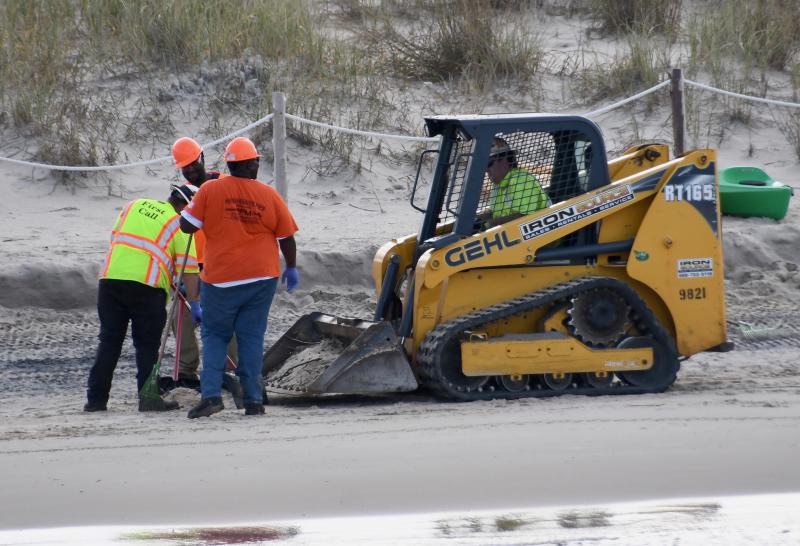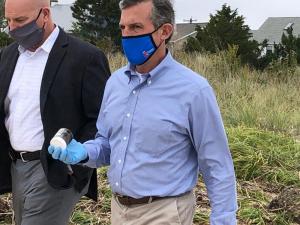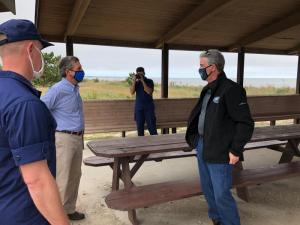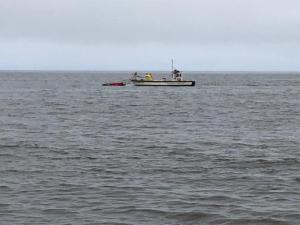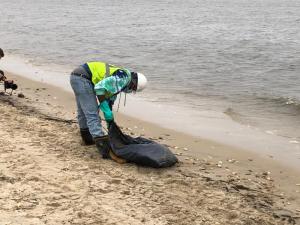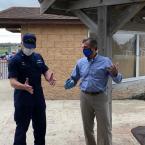Twenty-one tons of oily sand and debris have been removed from Cape Region beaches, as crews continue to clean up the result of an oil spill in the Delaware Bay near Broadkill Beach.
The Department of Natural Resources and Environmental Control and U.S. Coast Guard are spearheading a cleanup operation for the oil spill that has deposited blobs of oil called tar balls and oiled debris this week over a stretch of Delaware coastline extending from the upper Delaware Bay to the tip of the Atlantic Ocean. The cleanup operation intensified this morning with additional resources deployed by state and federal agencies, and nonprofit organizations.
At this point, state and Coast Guard officials do not know who is responsible for the oil spill.
More than 125 environmental professionals from DNREC, the Delaware Department of Transportation, the Coast Guard and its environmental contractor, and the Delaware Bay and River Cooperative are expected to be engaged Oct. 23 in removing oil found littering beaches and rafting around debris offshore. The Delaware Bay and River Cooperative, a nonprofit funded by industry in the event of an oil spill, dispatched an oil-skimming vessel to remove oily debris seen Oct. 22 afloat in the bay. Tri-State Bird Rescue of Newark continued to play a key role in the cleanup coalition, investigating reports of wildlife impacted by oil, and treating captured seagulls and other wildlife that has been oiled in the water.
“We are grateful for our interagency collaboration with DelDOT and for the help from the Delaware Bay and River Cooperative enabling us take the cleanup onto the water,” Garvin said.
Petty Officer 1st Class Steve Lehman said the Coast Guard is continuing to monitor the beach, utilizing crews on the ground as well as drones to determine where they need to focus clean-up efforts. The Coast Guard has added contractors to expedite the process, he said.
“We continue to mobilize our expert resources as the tides spread oil from the beaches back into the water and back on the beach,” said DNREC Secretary Shawn Garvin. “We are combing the beaches, and shovel by shovel, removing the tar balls and contaminated sand.”
The crews are manually removing oil patties and tar balls found on various locations along the coast. Approximately 21 tons of oily sand and debris, filling 1 ½ dumpsters, had been removed from the affected areas as of 7 p.m., Oct. 22.
Capt. Jonathan Theel of the U.S. Coast Guard, who is in charge of the cleanup effort, said so far, 24 seagulls have been found with oil on them, but he added that the birds seem unaffected. He said while the spill will take another week to finish cleaning, fortunately, the impact to marine wildlife has not been as bad as it could have been. Theel said those responsible for the spill could face prosecution and/or fines.
Gov. John Carney toured the Coast Guard’s command center for the cleanup effort on Slaughter Beach Oct. 23. Holding a jar of oiled cleaned up from Delaware’s beaches, Carney held a beach side press conference with Garvin and Theel.
“It’s a reminder of our precious environment here, and the vulnerability of it. This is a small-scale reminder, but you can see what the negative impacts would be on these communities, on our natural environment and our economy,” Carney said. “In the scheme of things, it’s not a really big spill, but still, 20-some miles of coastline were affected. It’s a constant reminder that our natural environment needs to be protected.”
The City of Lewes has closed its beaches temporarily due to oil that has come ashore and posed a threat to people and pets who visit the shoreline. DNREC closed the four-wheel-drive surf-fishing crossing at Beach Plum Island Nature Preserve, overseen by Delaware State Parks, so cleanup operations will not be hampered by vehicles tracking oil onto the sand.
While the oil spill cleanup continues, the Coast Guard and DNREC strongly advise the public not to handle any oily product found or attempt to assist affected wildlife along the shore, but to report these findings to DNREC's environmental hotline at 800-662-8802 so the situations can be addressed by hazmat-trained professionals.











